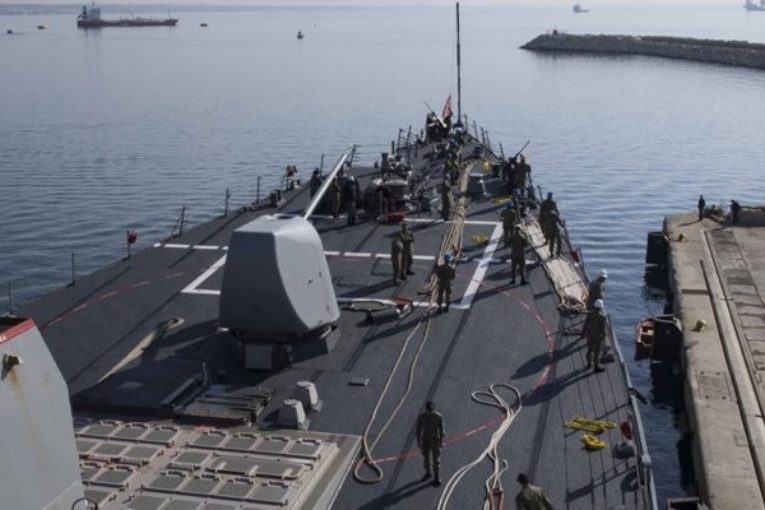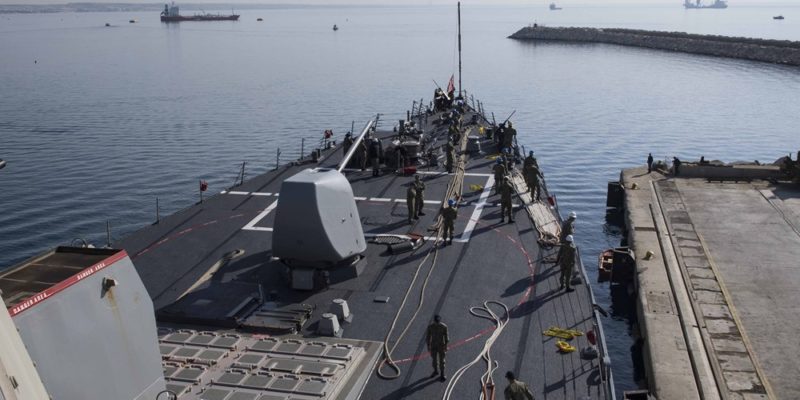

NEW YORK (Reuters) – Oil hit its highest in more than three years on Wednesday after Saudi Arabia said it intercepted missiles over Riyadh and international tensions about Syria grew.
Both U.S. crude and global benchmark Brent traded at the highest levels since 2014 as concerns about airstrikes drove the market higher.
Geopolitical concerns overshadowed global crude inventories as the markets’ main driver.
“A bearish inventory report was quickly negated on word of intercepted rockets over Riyadh, which just adds to the recent spike in geopolitical tensions,” said Anthony Headrick, energy market analyst and commodities futures broker at CHS Hedging LLC.
Prices began to rally as U.S. President Donald Trump threatened to fire missiles at Syria in response to a suspected chemical attack last week.
Prices climbed further as Saudi Arabia’s air defense forces intercepted a missile over the capital Riyadh on Wednesday, Saudi-owned broadcaster Al Arabiya said, after at least three blasts were heard in the city.
Brent crude jumped to a high above $72 a barrel, its strongest since early December 2014, after Trump’s comments, while U.S. crude rose above $67 a barrel. Gold rallied for a fourth day as investors ditched risk-linked assets such as equities.
Brent rose $1.59 on the day to $72.63 a barrel by 11:03 a.m. EST, while U.S. crude futures rose $1.62 cents to $67.13 a barrel, a 2.5 percent gain.
Some major airlines were re-routing flights on Wednesday after Europe’s air traffic control agency warned aircraft flying in the eastern Mediterranean to exercise caution due to possible air strikes on Syria.
Trump has criticized Moscow for standing by Syrian President Bashar al-Assad.
“Russia vows to shoot down any and all missiles fired at Syria. Get ready Russia, because they will be coming, nice and new and ‘smart!’,” he wrote in a post on Twitter on Wednesday.
The United States and its allies are considering air strikes against Assad’s forces following a suspected poison gas attack last weekend.
Syria is not a significant oil producer, but any sign of conflict in the region tends to trigger concern about potential disruption to crude flows across the wider Middle East, home to some of the world’s biggest producers.
There are also concerns that the United States could renew sanctions against Iran.
“The focus right now is definitely on a possible military strike against Syria,” said Commerzbank’s head of commodity research, Eugen Weinberg.
“We think the fundamentals do not justify the current price, but unfortunately the market is focusing more on the politics and ignoring some of the warning signs, especially the hike in U.S. oil production.”
Saudi Arabia Energy Minister Khalid al-Falih said on Wednesday that his country would not sit by and let another supply glut surface, implying that the de-facto leader of the Organization of the Petroleum Exporting Countries (OPEC) would continue to withhold supply.
Not all oil market indicators suggest the price will continue to rally strongly, analysts said.
U.S. crude inventories rose by 3.3 million barrels in the week to April 6, according to the U.S. Energy Information Administration, compared with analysts’ expectations for a decrease of 189,000 barrels.
Despite the focus on the rocket over Riyadh, the market remains focused on fundamentals, said Abhishek Kumar, senior energy analyst at Interfax Energy’s Global Gas Analytics in London. “Market participants will closely watch oil-production profile in the U.S., which is also expected to have a material impact on the outcome of the upcoming OPEC meeting in June,” he said.
You can read more of the news on source



